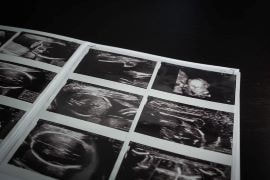
Ultrasound can be very helpful during pregnancy. Ultrasound can tell where the placenta is located, if it is on scar tissue for someone wanting a VBAC, or how close the placenta is to the cervical opening in suspected cases of placenta previa. It can tell if baby is breech or head down, or outside the uterus in the case of an eptopic pregnancy. It can also detect some fetal anomolies such as a 2 vessel cord instead of a 3 vessel umbilical cord, kidney issues, heart defects and many other anomolies that may be concerning or require additional medical attention. And of course, it can show baby's gender, or what baby is doing at the time of the ultrasound. It can be amazing to see your baby doing things like sucking their thumb or having hiccups.
Ultrasound studies completed before 1992 showed no adverse affects. These studies were completed using lower intensity ultrasound. Since 1992, ultrasound intensity has increased by seven times without any in-depth studies to track if there are any effects from this higher intensity. We do know ultrasounds can heat up water and tissue. The longer the ultrasound is applied, the higher the risk of overheating the tissues and amniotic fluid.
I may ask my clients to get an ultrasound if there is information I feel we need to provide optimal care. For instance I may ask a client who is planning a VBAC to get an ultrasound to verify where the placenta is located in relation to the cesearan incision site, or to confirm baby is head down if we are wondering about a breech presentation. I do not require my clients to have an ultrasound as a routine part of my prenatal care. If my client wants to get an ultrasound, or decides not to is their choice. I support my client's decision regardless of what they choose.
I may ask my clients to get an ultrasound if there is information I feel we need to provide optimal care. For instance I may ask a client who is planning a VBAC to get an ultrasound to verify where the placenta is located in relation to the cesearan incision site, or to confirm baby is head down if we are wondering about a breech presentation. I do not require my clients to have an ultrasound as a routine part of my prenatal care. If there is nothing concerning that I would ask a client to get an ultrasound for, then my clients can decide if they want to have an ultrasound. I support my client's decision regardless of what they choose.

 RSS Feed
RSS Feed